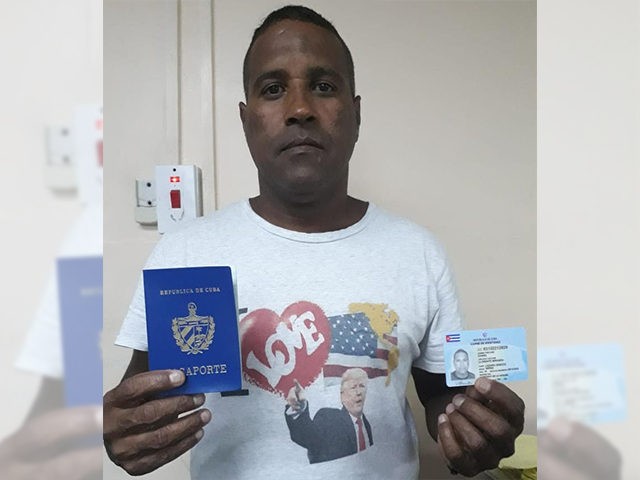An over 200-page report published by a coalition of human rights NGOs Wednesday concluded “without fear of error” that Cuba has violently forced or threatened to force “hundreds” of political dissidents into exile, in many cases buying them plane tickets and taking them to the airport at gunpoint.
Cuban Prisoners Defenders, an NGO dedicated to pro-democracy judicial action, along with the Patmos Institute and the Foundation for Pan-American Democracy, debuted the report at a press conference in Madrid on Wednesday. The groups identified 77 cases of the Cuban communist regime threatening to or actually expatriating dissidents during their research in just the week of June 11-18.
The report sent dissidents suspected of having suffered abuse and expropriation a uniform survey, confirming “35 victims of forced expatriation and 42 victims of grave threats instigating forced expatriation.” They note that these cases form “only a small part of all those expatriated who have left Cuba under the same conditions detailed in this denunciation.”
“We can, without fear of error, [say] that these cases occur at the scale of hundreds annually, and that these have affected thousands of human rights activists, independent journalists, dissident artists, religious leaders, and other organized pacific groups,” the report asserts. “The number of those not belonging to any group, and those who no one has heard news of, could [increase] the cases to many times the number deduced by this study.”
Most of the confirmed cases of expatriation in the report are members of dissident groups, like the Patriotic Union of Cuba (UNPACU), as these groups have struggled to maintain contact with the disappeared and its members more likely to denounce the government. In the cases of independent dissidents, those documented are individuals who have attracted international attention and, as such, could not disappear overnight without pressure from human rights groups.
The exiled say, almost uniformly, that the Castro regime threatened to harm them or their families if they did not leave Cuba. They were largely forced to cut all ties and communication with their family members who, they say, were not told of their permanent removal from the territory.
All are Cuban citizens, meaning they have no legal residency anywhere else in the world. Most were, however, sent to countries where Cuban citizens do not need visas to enter.
Most of those who have been forced into exile have landed in Guyana, a nation that does not require Cuban citizens to have visas to enter. The two best-known cases of expatriation are those of Eliécer Góngora Izaguirre, an UNPACU member who police escorted to the airport and sent to Georgetown, Guyana; and Daniel Llorente Miranda, an independent dissident who became famous internationally after interrupting the 2017 May Day parade in Havana waving an American flag. Llorente went missing in late May before resurfacing, telling Breitbart News that police threatened to “disappear” him if he ever set foot in Cuba again.
Others listed as having been threatened with violence if they do not leave the country include several members of the Ladies in White, a peaceful pro-democracy Christian group whose members are the female relatives of political prisoners. Their sole act of protest is to attend Catholic Mass on Sundays dressed in white and carrying images of their imprisoned relatives, for which they are often the target of brutal beatings and arrests.
Other countries with notable populations of involuntary Cuban exiles are Trinidad and Tobago, Chile, and Panama. Several have made their way to Costa Rica and are attempting to enter the United States and legally request political asylum, citing the threats against them.
Many of these repatriations are made possible by cooperation between the Cuban government and Aruba Airlines, the report notes. Aruba Airlines, which flew Daniel Llorente to Guyana and told Breitbart News they had no evidence that a person with that name had flown to Georgetown, is a Venezuelan airline. Venezuela is Cuba’s closest ally, and some say colony, in Latin America.
The Guyanese government’s role in these expatriations remains unclear. In Llorente’s case, the government claimed to not have evidence that Llorente had entered the country or passed through customs until Breitbart News, in conjunction with the Guyanese newspaper Kaieteur News, proved Llorente’s presence in Guyana. The Prisoners Defenders report notes, however, the close “personal” connection that Guyanese President David Granger “is receiving treatment for a very difficult disease on the island … which will influence, having created such close ties to Cuba in this state crime, in turning his political institutions into coparticipants by action and omission” in the expatriations.
Georgetown announced in March that President Granger had completed his first round of treatment for Non-Hodgkin Lymphoma in Havana that month. Cuban doctors diagnosed him with the cancer in October.
Following the report, the NGOs involved in publishing it are seeking international action to stop these forced exiles and punish the Cuban regime. They intend to bring the report to the United Nations, where the Castro regime enjoys a plum position on the Human Rights Council, to seek international action to stop the practice.
The Organization of American States (OAS) has also expressed interest in the cases.
Nos parece de absoluta gravedad la denuncia contra la dictadura cubana por expatriaciones forzosas a disidentes que hoy presentó la ONG Cuban Prisoners Defenders @CubanDefenders https://t.co/Dth5w84omf
— Luis Almagro (@Almagro_OEA2015) June 19, 2019
“The denunciation against the Cuban regime for forced expatriations of dissidents presented today by the Cuban Prisoners Defenders NGO appears to us to be of absolute gravity,” Luis Almagro, the secretary-general of the OAS, said on Twitter Wednesday. He did not elaborate on any specific actions the organization may take in response to the report.

COMMENTS
Please let us know if you're having issues with commenting.